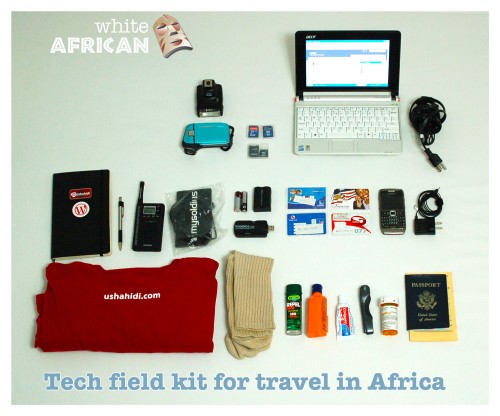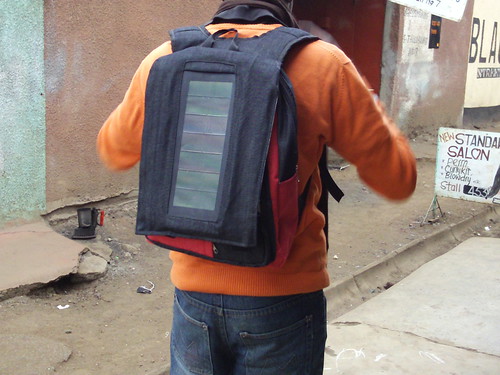Apparently, when you’re a foreigner traveling in the developing world, your biggest problems are that you’ll be set upon by bandits or get in a horrible car wreck. Nicholas Kristof is a well-traveled journalist for the NY Times, going to some of the most far-flung reaches of the world, so he does have good advice for travelers. It’s just a pity, as Chris Blattman points out, Kristof ends up undermining his own stated reason for writing the piece (to get more college students traveling in the developing world) by fostering this idea that international travel is inherently dangerous.
Here’s one of my favorites (can’t you just see everyone lining up to visit the Philippines after reading this?):
“10. Don’t wear a nice watch, for that suggests a fat wallet and also makes a target. I learned that lesson on my first trip to the Philippines: a robber with a machete had just encountered a Japanese businessman with a Rolex — who now, alas, has only one hand.”

In response to Kristof’s op-ed, here are my take. Not all about your kit, but also some thoughts on traveling in general.
15 Africa travel tips (not related to bandits, thugs and murder):
1. Take only one bag. “Suitcases are for suits, check-in for suckers” as my well-heeled friend Jan Chipchase points out. My choice is the Northface Heckler backpack (in black). It’s got a convenient sleeve for my computer, and plenty of room for the camera and other items – your mileage will vary.
2. Pack less. This is what makes #1 work. You’re going to be tempted to pack for every eventuality. Don’t. only to find out when you get there that you only need 1/3 of what you brought.
3. Carry a power bar. Usually you can find food wherever you are, however for the small cost in space having something handy that gives you some energy and that you can trust to not get a stomach bug over, this is my first choice.
4. For the techies… USB devices are great for transferring information, applications and pictures use one. However, remember that there are no condoms for USB devices and that every PC and internet cafe device should be treated as a pox-ridden carrier of digital STDs for your virgin device. Keep it faithful to only your computer (and vice versa).
5. Paperbacks trump hardbacks. There’s a lot of waiting around when traveling, which makes it nice to have a book handy.
6. On mobile phones. You have two choices on your phone. a) buy a cheap one when you get there ($20-40) and get a local SIM card. b) get an unlocked phone before you leave and just buy a SIM card when you hit the ground. For multi-country travel I suggest going with “b”, which is what I do. If you lose a lot of phones, or are terrified of being robbed, go with “a”.
7. Bargain for everything. Have a great conversation with the first seller of whatever service or product you’re interested in. Never buy from that person. Instead, figure out exactly where the line is and then haggle harder with the next vendor, tout or merchant. (How can I state this delicately…? If you’re paying 25% of the asking price, you’re still being ripped off.)
8. On Cameras. A lot could be written about this, but suffice it to say that smaller is better unless you really like to take good pictures. I would suggest something that is waterproof. My personal favorite is the Sanyo Xacti – I love this thing. However, I could equally suggest getting something that runs off just a couple AA batteries. (Pros and Prosumers who, like me, carry a larger body DSLR ignore this one. You have your own rules to live by).
9. Spread your money out. Never carry all your money in one place. This isn’t just for security reasons, its for bargaining as well. I suggest carrying varying amounts of cash in 3 different spots and knowing what the amounts are so that you never pull out too much.
10. Eat local. This is especially true if you’re going on the cheap, don’t be afraid to eat the cooked foods at the road-side kiosks. You’ll see me regularly eating beans and chapatis on the streets of Nairobi for lunch. At $.50 I’m getting a good full meal and I can do it in a hurry if need be. If that’s too adventurous for you, you can choose other local spots, just don’t fall into the trap of thinking that you have to eat at the “westernized” establishments.
11. Mosquitos are made in hell and must be killed. I could write a whole post on the epic battles I’ve had with these satanic insects. Buy a can of Doom (insect spray), get insect repellent, sit on the smoky side of the fire, use a mosquito net – whatever it takes. My favorite way to kill them is a wadded up t-shirt as it has a wide area of impact – if you’re good you can smash them up against the wall/ceiling from a good distance away.
12. Remember your power adapter. Know what the outlets are going to be like where you’re going so you can recharge your computer and/or camera. Not knowing where you’re going, I would suggest this one – though a little big, it does fit almost everywhere you’re likely to travel.
13. Watches are overrated. It’s just one more thing to carry, use your cell phone for the time. Time doesn’t matter as much anyway to be honest… I haven’t worn one for years, but it could be I’m missing something here.
14. Drink a lot. I’m not going to get into it on whether you drink bottled water, sodas, beer or tap water – just make sure you’re drinking. You’ll end up sweating more, walking more and not realizing just how dehydrated you are until you notice that you haven’t gone to the restroom all day.
15. Toss out your expectations, embrace the differences. It’s not all going to fit the “standard” (as I reminded myself when I nearly bashed my skull in) that you think it should be. Just roll with it and keep a light-approach to life. When something goes wrong, which it will, remember that a smile, a shake of your head and a laugh will take you a lot further than the angry, frustrated and shouting “white person in Africa act” will.
The bonus tip is this: make friends locally and listen to them. They know the area and can point you towards people and places that you’ll get a lot out of. They also know most of the dangerous and dark corners of the region that you should stay away from, which Kristof talks of. People, at the end of the day, are your greatest assets when traveling, not your gear, knowledge or prior experience in the region.
Have tips of your own to add?
The best ones in the comments will be added here (so leave a link so I can attribute it to you).
From Ethan Zuckerman:
- Bring a hat. One you don’t mind wearing all the time, one you can wash in the sink or a bucket every night, one that keeps the sun from frying your brain. Or buy one. But this is a “don’t leave home without it†item for me.
- Undershirts keep you cooler. I rarely wear one in the States, but they’re essential equipment in tropical climes, and one of the few ways to remain presentable if you’ve got to do a business meeting.
- And an urban Africa tip – a cheap flashlight/torch is your friend when the power goes out and you’re staggering home from the bar at 2am. We refer to them in Ghana as “sewer avoidance systems†– trust me, fall into one open sewer and you’ll carry a torch with you for the rest of your life.
From Kari:
- Live as much like an average-incomed local as possible (very poor by US standards). it leads to richness.
From Patrick Meier:
- listen and make friends locally. Stress on all those words. Take the time to greet and exchange greetings with people whose paths you cross, everyone is important, chat with the guard outside your hostel, make every effort to learn the local language, it’s a sign of respect and is appreciated, say a warm hello to the mama selling the peanuts on the street, make friends with taxi drivers, and know how to ask questions, and then how to listen.
From Alan Davidson:
- Carry a copy of your passport and an international driving license. Don’t know how many times a copy of my passport and not the original has saved me a world of trouble.
From JKE:
- I used to carry a USB-2-mobile cable instead that plugs into any USB port and also comes with an adapter for the 12v socket in any car. Helps you get some energy where there’s no socket and is much lighter than most power adapters.
From Tony Durham:
- If you can’t patch holes in the mosquito net, apply some repellent around the hole.
From Christopher Fabian:
- Nokia phone with built in flashlight becomes a clock, alarm, torch and phone…magically!
- Two each of small packets of tylenol cold (2 daytime / 2 nightime) are great if you get slammed with some bug and just need to get through a day and a night somewhere.
From SW:
- Always have tissues with you as the lavs are seldom well stocked.
From Catherine:
- Especially in very busy areas like indoor markets, hugely populated street corners, etc, I carry my day backpack on my front.


